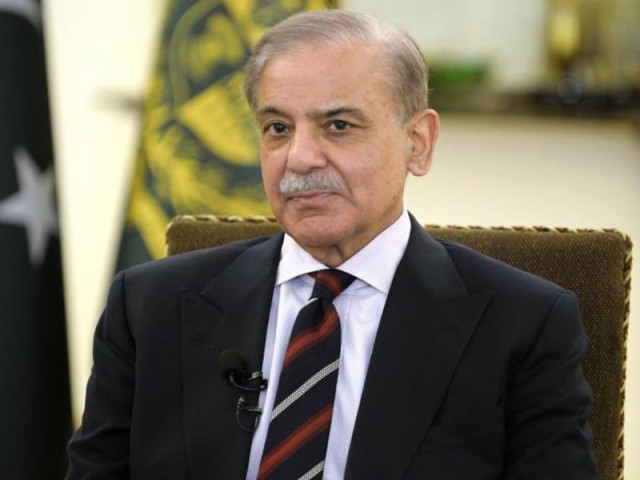Pakistan eyes loans, infra deals during PM's China visit
Govt decides to make bullet payments to Chinese power plants to reduce outstanding dues

On the eve of the prime minister’s departure to Beijing, Pakistan decided to make a bullet payment to Chinese power plants for reducing their outstanding dues in a bid to break the ice to secure financing for infrastructure projects and a $600 million commercial loan.
Sources told The Express Tribune that the energy ministry was processing Rs70 billion payments to the Chinese power plants, although the Prime Minister’s Office desired to clear at least Rs150 billion payments.
They said that the Ministry of Finance released Rs225 billion to the energy ministry out of the budgeted subsidies aimed at providing maximum room for making payments to the Chinese power plants.
However, no additional funds were provided and the expectation was that the energy ministry would create the space while remaining within the approved envelope. An official of the Energy Ministry confirmed only Rs70 billion in payments.
Read more: CPEC spotlighted as PM heads to China
The Finance Ministry gave Rs70 billion in pending K-Electric arrears, Rs100 billion in advance claims of the subsidies and another Rs55 billion was released against Azad Jammu and Kashmir subsidy.
The sources said that in a meeting held a few days ago, Prime Minister Shehbaz Sharif had desired that at least Rs150 billion should be released to the Chinese power plants.
As of the end of April, the outstanding dues of the Chinese power plants set up under the China-Pakistan Economic Corridor (CPEC) amounted to Rs506 billion or $1.8 billion.
After he visited Beijing, Foreign Minister and Deputy Prime Minister Ishaq Dar had advised Prime Minister Shehbaz Sharif to clear at least Rs200 billion dues of Chinese IPPs from now till July. The money is being released on the intervention of Ishaq Dar and the Prime Minister.
The Ministry of Finance had already communicated to the International Monetary Fund that it did not have any plan to release money to CPEC IPPs over and above the available fiscal space in the budget.
Read: PM’s China trip to target economy
The sources said that during his visit starting today (Tuesday) the Prime Minister was keen to make tangible progress on the Mainline-I project of the CPEC, Kohala hydropower Project, Azad Pattan hydropower project and Karakoram Highway expansion.
The government was also hopeful of getting $600 million in commercial loans from Beijing, which Chinese authorities had earlier refused to give due to Pakistan’s failure to honour the energy framework agreement.
In January this year, China linked the approval of a $600 million new foreign commercial loan with the prior settlement of the debt that Pakistan owed to the Chinese power plants. Pakistan is seeking from the Industrial and Commercial Bank of China (ICBC) and the Bank of China a total loan of $600 million. Each bank has long been approached for $300 million in financing.
Under the Energy Framework Agreement of the CPEC, Pakistan had committed to setting up a revolving fund and depositing an amount equal to 21% of the invoices generated for power payments. The 21% is the sum that the Pakistani authorities fail to collect, adding to the vicious power sector circular debt. The arrangement had been sought to protect Chinese firms from circular debt.
But instead of setting up a fund, Pakistan in October 2022 opened a Pakistan Energy Revolving Account (PERA) at the State Bank of Pakistan with Rs48 billion in annual allocations with a condition to withdraw a maximum of Rs4 billion per month. As a result, the Chinese IPPs’ debt is now hovering around Rs500 billion.
Out of the Rs70 billion, a significant chunk is being paid to the Thar Coal project of the CPEC.
Due to huge outstanding liabilities, Chinese insurance company M/s Sinosure is also not providing any fresh lending to power sector projects in Pakistan. This has affected the Kohala hydropower and Azad Pattan hydropower projects.
During a recent interaction with the Chinese authorities, Pakistan requested to show progress on these two hydropower projects, the sources said. However, the Chinese officials urged to move carefully due to the energy sector viability issues, they added.
The prime minister has listed the two power plants as part of the tangible outcomes of his visit.
The Prime Minister also wants to sign an agreement on the construction of the 1,726-kilometer-long $6.7 billion Mainline-I project of the CPEC. However, the sources said that the Chinese authorities advised Pakistan to first begin construction work only on the 182 km long Karachi-Hyderabad section of the track.
The revised cost of the Karachi-Hyderabad section is now $1.1 billion, which both China and Pakistan can afford to finance.
The Karachi-Hyderabad Section will be constructed as per original design i.e. speed 160 km per hour with complete fencing, unlike the rest of the track where the speed has been reduced to 120 km per hour and the fencing has been eliminated to save the cost.
China, in the past, had also raised the issue of Pakistan’s overall public debt unsustainability and its implications for obtaining a $6 billion new loan for the Mainline-I railways project of the CPEC.
The sources said that the Pakistani authorities also wish to achieve some progress on the $2 billion Karakoram Highway section of Raikot-Thakot. The Chinese authorities sought some time to work out the modalities of the project.
They added that China has asked to provide electricity to Gwadar and make the port city commercially active. Pakistan imports electricity from Iran to meet the electricity needs of Gwadar –the jewel of the CPEC.
The Prime Minister is expected to give an assurance to the Chinese leadership that in future no terror incident like the Bisham attack, in which five Chinese nationals were killed, would take place due to the additional measures that it is taking to protect Chinese nationals.
Pakistan has also processed over $2.5 million payment in compensation to the families of the Chinese deceased nationals.



















COMMENTS
Comments are moderated and generally will be posted if they are on-topic and not abusive.
For more information, please see our Comments FAQ